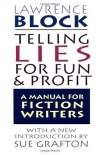Manual For Fiction Writers by Block, Lawrence (classic books to read .TXT) 📗

Book online «Manual For Fiction Writers by Block, Lawrence (classic books to read .TXT) 📗». Author Block, Lawrence
The advantage of this particular novel approach, the Narrative Push method, is that you're by no means locked into a formula. I think it was Theodore Sturgeon who argued that if the writer has no idea what's going to happen next, the reader certainly won't know what's going to happen next.
For my own part, I've come to prefer to know a little bit more about a book than how I'm going to open it. I've written too many books in recent years that ground to a halt somewhere around page seventy because I couldn't think of anything to have happen on page seventy-one. But I don't have to know everything. I like to know where the book's going and what direction it'll take to get there, but I don't need to have the whole route mapped out for me.
Ê
Suppose I spend a year writing a novel and it proves unsalable. I can't risk that much time?wouldn't it be safer to stick to short stories?
Ê
Would it? Let's assume that you could write twelve or twenty short stories in the time it would take you to write a novel. What makes you think you'd have a better chance of selling them? And why would a batch of unsalable short stories feel less like a waste of time than an unsalable novel?
I think what keeps a lot of us from attempting a novel is simple fear. Fear that we'll give up and leave the book uncompleted, or the greater fear that we'll complete it and have produced something unpublishable. I don't think these fears are justified even when they prove true.
So what if a first novel's unsalable? For heaven's sake, the great majority of them are, and why on earth should they be otherwise? In every other trade I've ever heard of it's taken for granted that one will put in a lot of work before attaining the level of professionalism. Why should we expect our writing to be instantly publishable?
Writing a novel is an extraordinary learning experience. You have room in a novel, room to try things out, to make mistakes, to find your way. The writing of an unpublishable first novel is not a failure. It is an investment.
A few years ago I read Justin Scott's first novel in manuscript. It was embarrassingly bad in almost every respect, and hopelessly unpublishable. But it did him some good to write it, and his second novel?also unpublishable, as it happened?was a vast improvement. As I write this, his novel The Turning is Dell's leader for the month, and his forthcoming book The Shipkiller is shaping up as a strong candidate for bestsellerdom. Do you suppose Justin regrets the time he wasted on that first novel?
I'd like to write a novel?but I don't have a good enough idea for one.
Ê
If you're having trouble coming up with ideas, you're better off with a novel than short stories.
Does that seem odd? You might think that a novel, covering so much more ground and so many more pages, would require more in the way of ideas. But it doesn't usually work that way.
Short stories absolutely demand either new ideas or new slants on old ones. Often a short story is little more than an idea polished into a piece of fiction.
I like to write short stories?I get more sheer enjoyment out of writing them than novels, if less remuneration. But each one requires a reasonably strong idea, and the idea's used up in a couple of thousand words. I've written whole novels out of ideas with no more depth to them than short-story ideas, and I've written other novels without having had a strong story idea to begin with. They had plot and characters, to be sure, but those developed as the book went along.
Ed Hoch makes a living writing nothing but short stories?he may be the only writer of whom that's true?and he manages because he seems to be a never-ending fount of ideas. Getting ideas and turning them into fiction is what gives him satisfaction as a writer. I sometimes envy him, but I know I couldn't possibly come up with half a dozen viable short-story ideas every month the way he does. So I take the easy way out and write novels.
Hmmm. Time's up, and I see a lot of you have your hands raised. Take a deep breath and go on to the next chapter.
CHAPTER 5
Nothing Short of Novel
IN THE foregoing chapter we had a look at the advantages of writing a novel rather than limiting oneself to short stories. We noted that novels are easier to sell, more profitable for their authors, and constitute a considerable learning experience for the novice writer. Now let's deal with a few more questions some of you have on the subject.
Ê
I'm afraid to write a novel because I'm not that smooth a stylist. Don't you have to be a better craftsman to make a novel come off?
Ê
I don't think so. Sometimes it's just





Comments (0)